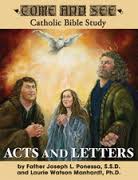Book Review: Come and See: Acts and Letters by Joseph L. Ponessa
Disclosure: This is a book received from the Firstreads program, on the premise that I would review it. Also, I should mention here that I am a Christian, although not Catholic, so my reaction to this is necessarily different from what it would be if I were a devout Catholic, or a non-Christian.
As a Bible study guide, Come and See: Acts and Letters is not a stand-alone book; you’ll need both a Bible (preferably a Catholic one with all the books) and a catechism for full effect. Likewise, the fact that I read this solo is not in keeping with its true calling as a group activity. That said, let us begin the actual review.
Unlike some bible study courses I’ve seen in the past, there are not separate leader’s and student’s books. Thus the first section of the book is a “how to use this course” guide, with helpful instructions on setting up the study groups and organization. I found this section very helpful, but there were a couple of moments where the authors’ assumptions glared–most notably a blind spot about the possibility of men taking turns helping with childcare too.
The main text covers Acts and the Pauline letters, arranged in roughly chronological order. (Thus bits of Acts are split up between the letters.) I should mention here that the publisher is Emmaus Road, a reference to Paul’s conversion, and it’s clear that the authors favor Paul.
In addition to covering the content of the text, there are explanations of how these words fit into Catholic theology, some outside information on the history of the early Church, and plenty of quotations from Catholic theologians, especially John Paul II and Pope Benedict. A fair amount of time is spent on fitting pieces together, explaining how seemingly contradictory information is brought together as a whole.
Each short study section is followed by a quiz section, referring to other books of the Bible and the catechism to help bring the material into perspective. There’s also suggestions for social interaction outside the formal study.
Optional study materials include videotaped lectures by the author if there is no one in the group comfortable with that function–these did not come with my book. What did was an issue of “Lay Witness” magazine, which had some fine articles on witnessing from a lay Catholic perspective.
Overall, I found this an excellent work of its type; I do not agree with all its theology, but it is clear and consistent.
Peace be with you and yours.


